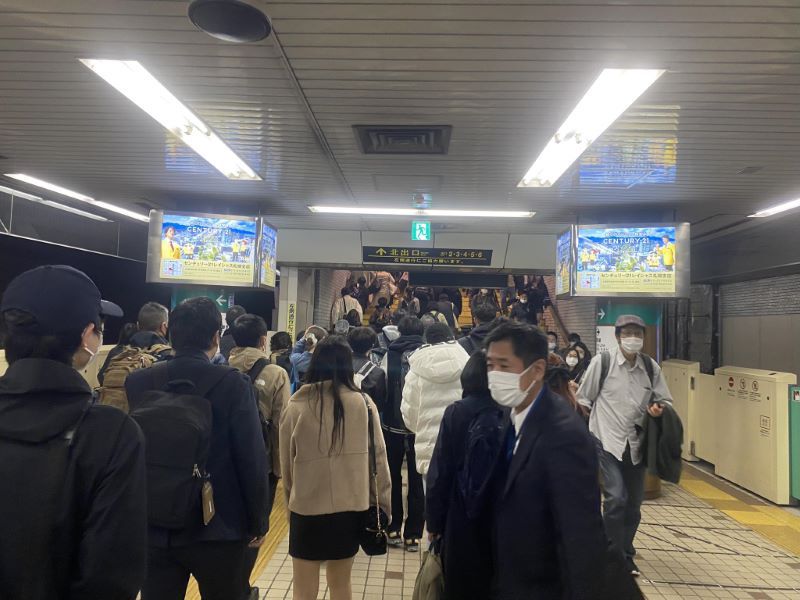
Finding a job in Japan might not be exceedingly challenging, but establishing a thriving career can be as rare as finding a four-leaf clover in a vast green field. It’s crucial to choose wisely, be alert to red flags, and leverage each job as a stepping stone towards your desired position and salary.
In this guide, I’ll outline strategies for seeking employment in Japan, both for those already in the country and for those abroad. Remember, many positions in Japan require you to be a current resident with a valid working or student visa.
This article will take approximately 19 minutes to read. Don't have the time right now? No worries. You can email the ad-free version of the article to yourself and read it later!
Disclaimer: This article may include links to products or services offered by ExpatDen’s partners, which give us commissions when you click on them. Although this may influence how they appear in the text, we only recommend solutions that we would use in your situation. Read more in our Advertising Disclosure.
Contents
- Is It Easy to Get a Job in Japan?
- What Kind of Job Can You Get in Japan as a Foreigner?
- Do I Need to Speak Japanese to Work in Japan?
- Job Requirements
- Job Search Strategies
- How to Make a Successful CV
- How to Prepare a CV Photo
- Tips for In-Person and Online Interviews in Japan
- Visa and Work Permit
- Understanding Your Salary in Japan
- Income Tax
- Pay Periods
- Bonus Incentives
- Paid Leave and Benefits
- Health Insurance and Health Checkup
- Potential Work Challenges
- Now, on to You
Is It Easy to Get a Job in Japan?
Out of a population of approximately 123 million people, only about 1.82 million foreign workers were in Japan in 2023. This relatively low number represents a small fraction of the total population.
In addition, Japan has one of the world’s strictest immigration policies.
So, it can be a challenge to get a job and move to Japan. To increase the chance of getting a job here, you need to have a record of work experiences, degrees, and certifications.
Being able to speak Japanese is also a big plus. UnSo, it can be a challenge to get a job in Japan.
Obtaining a job in Japan can be challenging. To increase your chance of getting a job here, you should have a record of work experiences, degrees, and certifications.
Proficiency in Japanese is also a significant advantage.
Furthermore, securing a higher position can be even more daunting, as many companies currently prefer Japanese citizens for high-level roles.
However, in recent years, the demand for foreign workers has increased due to the aging Japanese population and declining birthrate, leading to a shortage of young, able-bodied workers for specific jobs.
So, it’s highly possible that getting a job in Japan will become easier over time.
What Kind of Job Can You Get in Japan as a Foreigner?
The manufacturing sector employs the largest number of these foreign workers, which includes factory labor, assembly, shipping, and other production-related tasks.
This sector accounts for about 43% of foreign employment, while the remaining 57% work in various service sectors such as teaching English, hospitality, tourism, IT, translation, interpretation, and engineering.
The majority of the foreign workforce hails from countries like Vietnam, China, and the Philippines, making up about 60% of all foreign workers in Japan.

Many native English speakers opt for ALT (assistant language teacher) companies as an entry point into Japan.
These roles are typically reserved for individuals from countries like the UK, Australia, Ireland, New Zealand, the US, South Africa, Wales, and Canada.
While some ALT companies might have varied criteria, organizations like JET Programme, Interac, AEON, and ECC often require native English for employment.
Here, foreign teachers instruct English in elementary, junior high, and high schools across Japan. Notably, the JET Programme, which offers competitive pay, subsidized rent, and flight reimbursements, is one of the most sought-after but also challenging to secure.
There are also foreigners working in managerial positions. However, unless you are already in Japan, securing such positions is challenging, as they are quickly filled by professionals who reside in Japan and have substantial experience.
Do I Need to Speak Japanese to Work in Japan?
While not necessary for all industries, having a Japanese Language Proficiency Test (JLPT) certificate can significantly aid your job search.
Many positions in Japan require JLPT 2 or JLPT 1 proficiency. Passing these tests, though challenging, can significantly enhance your integration into Japanese society and expand your career options.
Without language proficiency, you risk limiting your earning potential and job opportunities in Japan.
In addition, it can be a challenge to live in Japan if you can’t speak Japanese.
Job Requirements
Like any job market around the world, the certifications or degree level required for a particular job depends on the field.
For English teachers, ALTs, and Eikawa company teachers, a minimum of a 4-year bachelor’s degree is required.
Although a degree in education is preferred, it’s not mandatory.
If you’re interested in teaching English, obtaining a TEFL/TESOL certification can be advantageous.
For professions like medicine and law, you’ll need a relevant degree, significant experience, and certifications from recognized Japanese professional examinations.
Most Japanese companies mandate a 4-year bachelor’s degree. An exception might be in the IT industry, which can sometimes accept equivalent experience instead of a formal degree.
Holding a master’s or doctoral degree grants access to tertiary education positions or research-related jobs. It’s essential to note that proficiency in Japanese is highly desirable.
Job Search Strategies
I’ve compiled several common methods for finding a job while you’re still in your home country.
There are many great job listing websites with good filters, allowing you to tailor your search to specific job criteria.
But you still need to delve into the job terms and details they provide in order to find a suitable job.

Here are specific pieces of information I recommend looking for:
- How long do they sponsor your work visa, and what is the duration of the contract?
- If the contract is for one year, are you comfortable with that level of job security?
- What is the salary, and is it competitive within the industry?
- What are the typical work hours? Is there a possibility of mandatory overtime or weekend shifts?
- As for the workload, always remember that the description might not reflect the reality. It’s wise to consult employee review sites, like Glassdoor, for past employee experiences.
- Ensure the company adheres to labor laws. It might surprise you how many Japanese companies find ways to exploit workers for their own profit.
Below, I’ve listed some good resources to help you get a job in Japan.
Job Portals and Helpful Websites
If you’ve worked in Japan for a long time and built networks and connections in your industry, you may not need these resources.
However, if you just start out in your job search, these platforms are incredibly useful.
Below are three primary job search sites and a brief description of each. There are more websites available, but these are some of the most prominent:
- GaijinPot: While the translation, “a pot of foreigners,” may not paint the most appealing picture, GaijinPot is a comprehensive job portal for both entry-level and experienced positions in Japan. It features numerous job listings across sectors, many of which require minimal Japanese proficiency. The site also offers resources for those looking to study in Japan.
- Jobs in Japan: This site provides a comprehensive platform for your job search. It’s essential to note that many “teaching” positions listed are quite similar. Without a teaching license, specialized training, or advanced degrees, you’ll mostly find opportunities in native ALT (assistant langauge teacher) roles, pre-school education, and various dispatch or tutoring services. Dispatch firms hire and assign you to teach at various locations within a region, with conditions varying across companies.
- Daijobs: This site targets professionals seeking advanced positions. Before starting your search, you’ll need to create a profile and resume. Many jobs here demand high Japanese proficiency, often referencing the JLPT (Japanese Language Proficiency Test) levels.
Recruitment Agencies
If you prefer a more hands-off job search approach, recruitment agencies can help—for a fee. These firms provide personalized coaching, skill-matching software, and boast high placement rates for foreign candidates.
Here are some of the recruitment agencies you can check out:
Company Websites
Lastly, don’t overlook direct postings on company websites. Many organizations list openings on their sites, though not always in English.
If you’re proficient in Japanese and have a specific employer in mind, this method has a lot of opportunities.
How to Make a Successful CV
When job hunting in Japan, it’s crucial to adjust your CV to Japanese standards.
Your CV should spotlight relevant skills, work experience, qualifications, and educational credentials.
Whether you’re fluent in Japanese or not, it’s beneficial to prepare two CVs: one in English and another in Japanese. Include a cover letter detailing your motivation to join the company.
There are many translation services available, but I’ve found Upwork especially helpful for sourcing quality translators at reasonable rates.
I’ve been using it many times in translating complex documents between English and Japanese.
And while you might come across advice suggesting “handwritten resumes”, this typically doesn’t apply to foreigners.
Attempting to handwrite kanji can be challenging, so utilizing software like Microsoft Word or other standard writing tools is enough.
Some applications are even partially done online in the first phases of the process.
How to Prepare a CV Photo
A notable difference in Japan is the common practice of attaching a headshot to your resume.
You might ask yourself if this can be used as a method to discriminate against a candidate based on the way they look, instead of considering their merits and classifications. Simply put, the answer to this question is a resounding “yes”.
Although many companies will deny that this is a practice, it certainly one of factors in whether you get hired or not.
Here are some guidelines for your CV photo:
- Avoid using a smartphone or personal camera for the photo; an unprofessional picture might leave a negative impression.
- Consider using a photo booth, conveniently located throughout Japan. Ensure you dress professionally, and be mindful of the weather. If you opt for this, remember that any editing will be up to you after printing. Slight retouching using a photo editor has become more common in recent years.
- For a higher quality picture, consider visiting a photo studio. It might be costlier, but the results will be of superior quality, with the added benefit of professional advice.
- Both men and women are advised to don a dark suit (blue or black) with a white shirt for their resume photo.
Tips for In-Person and Online Interviews in Japan
If you’re applying from overseas, interviews will often be conducted online. However, the unique characteristics of Japanese interviews are similar, whether online or in-person.
Here are some interview tips and insights for your pre-interview preparation:
- Research Thoroughly: Don’t be caught unprepared. Familiarize yourself with your prospective workplace, its history, and any notable achievements you can commend during the interview.
- Master a Self-Introduction: Preparing a basic self-introduction in polite Japanese is essential. The Japan Academy and other educational websites offer useful examples. I suggest you review these and practice your introduction, either with a friend or in front of a mirror.
- Expect Personal Questions: Japanese interviews often delve into character analysis in addition to evaluating your professional experience. Unlike many Western interviews, it’s uncommon for Japanese interviews to be one-on-one. Expect to face a panel of at least three interviewers, each with their line of questioning in a round-robin style. Prepare anecdotes about your family life, hobbies, and other personal tidbits. Always present the information with a positive, upbeat attitude.
Visa and Work Permit
One of the most important things you will need is a work visa or permit; the paperwork is usually taken care of by your future employer if you are hired from overseas, but in case they do not help you with this, here are some necessary steps to take.
Ideally, your employer should contact the Japanese embassy to initiate the process.]
Then you need to submit the following documents to the embassy or consulate:
- Certificate of Eligibility (COE)*
- Passport
- Passport-sized photos
- Official visa application form
- Detailed company information
Note: The COE will be prepared by your employer. It can take up to three months to do it.
If you need to apply for the visa yourself, you should prepare for at least five months.
If your employer manages the visa paperwork, you’ll only need to submit your documents to them, and they’ll apply on your behalf.
Please note that there are many “working visa” types in Japan and these can cater to a range of professions, from university professors, artists, IT and tech, to business managers and medical doctors.
You can check the official Ministry of Foreign Affairs website for requirements.
Understanding Your Salary in Japan
As of 2023, Japan’s job market is somewhat turbulent, characterized by lower salaries (especially for foreigners) when compared to other nations and coupled with aggressive taxation.
Salaries for foreign workers vary depending on the industry and location.
For instance, an Assistant Language Teacher (ALT) typically earns about ¥250,000 per month. Licensed English teachers and those at international schools often fare better. While some websites might suggest higher potential earnings, this is highly dependent on your qualifications and experience.

In sectors with high demand for foreign expertise, such as technology and engineering, competitive salaries are more common. Within the IT industry, for instance, annual salaries for various roles range from 5,207,000 Yen to 14,580,000 Yen.
I’ve purposely excluded mentioning positions in finance or corporate sectors since they typically require native or business-level Japanese proficiency, and many of these roles are concentrated in Tokyo.
Income Tax
In Japan, you’ll need to pay various taxes, including personal income tax, health insurance, resident tax, property tax for land ownership, car tax, among others. Additionally, your tax amount can vary based on factors like age and family size.
This Japanese tax calculator will help you get a round figure on what you may pay according to your salary, but this is the tip of the iceberg.
Pay Periods
A consistent feature across most jobs in Japan is the monthly salary payment, typically paid on the 10th or 20th of each month, which will be paid directly to your bank account in Japan.
This contrasts with countries like America, where payment is often bi-weekly or weekly.
As a result, budgeting is crucial to ensure you can cover monthly bills and expenses.
Adjusting to this system might take time, so it is a good idea to maintain a savings reserve to cover your bills during the transition.
Bonus Incentives
Bonus structures differ between companies. Some offer generous biannual bonuses, distributed in summer and winter.
On average, the bonus equates to 3 1/2 months of your salary split into two payments.
For instance, with a monthly salary of 250,000 Yen, your potential bonus could be 750,000 Yen, divided into two separate distributions.
Not all companies provide two bonuses yearly; some might offer only one or none at all. During interviews, clarify this with potential employers.
However, broaching this topic might be perceived negatively by some hiring managers.
It’s worth noting that some firms may favor Japanese employees with bonus plans and stable contracts, while placing foreigners on successive temporary contracts. The workload is often the same, but the contractual terms and pay tend to favor those on permanent contracts.
Remember to review Japan’s labor laws, and educate yourself on your rights in the workplace.
Familiarize yourself with Japan’s labor laws to understand your workplace rights.
Paid Leave and Benefits
Generally, full-time employees receive about 10 days of paid annual leave after six months of tenure.
These leave days—usable as vacation or sick days—incrementally increase over the years, capping at 20 days. While this is a standard practice, always review your employment contract details.
Health Insurance and Health Checkup
Upon employment, you’ll be covered by Japanese national health insurance, which covers hospital care, mental health services, prescription medications, dental care, surgeries, and regular checkups.
A standout benefit in Japanese workplaces is the mandatory full health checkup provided yearly, covering comprehensive health assessments including vision, hearing, blood-work, cancer, or illness examinations. It also concludes with a brief advice session with a doctor.
As an employee in Japan, you need to have a health checkup every year, and your company provides the service so you do not have to find your own clinic or hospital.
The Japanese health insurance system is commendable for its expansive coverage and limited out-of-pocket expenses, making it superior to many counterparts worldwide.
Potential Work Challenges
Working in Japan presents a unique set of challenges, especially for foreigners. Undoubtedly, the most significant hurdle for foreigners is the language barrier.
There’s a high likelihood that the instructional emails circulating in your workplace will not be in English, and many of the meetings and day-to-day activities won’t be explained to you in simple English.
While you might have a senior co-worker who speaks both languages to assist you, you can’t rely on them indefinitely. It would be best if you enrolled in Japanese classes at your earliest convenience.
Alternatively, there are many online classes that offer a useful set of Japanese courses for self-study that you can follow at your own pace.
Another surprise for many foreigners working in Japan is the frequency of meetings and committees they’re expected to attend. Japanese roles often come with a barrage of paperwork throughout the year, and, in general, there’s a high expectation of commitment from their employees.
Depending on your workplace, you might find yourself in weekly or bi-weekly meetings. These often run long and are scheduled towards the day’s end. With many companies adhering to a strictly top-down management approach, it can be a lengthy process for a discussed idea to materialize into a concrete plan.

Nearly every proposal requires a written form that must be red-stamped by various departments and upper management, making progress and change in Japanese workplaces rather slow.
Additionally, many Japanese employees feel the pressure to prioritize their work over personal lives. This commitment might translate to working on weekends, extended work hours during weekdays, and receiving work-related emails from management even on days off.
Though there are many workplace cultural nuances, some additional aspects worth noting include the practice of gift-giving and omiyage at work, the emphasis on punctuality, the expectation to refrain from complaints, the work party drinking culture, the protocol for making requests, and company team mentality.
I recommend taking some time to research these topics before working in Japan.
Now, on to You
The reality of working in Japan is that it’s NOT an open playing field.
As a foreigner, you’re presented with quite limited “career” paths, and many of these avenues come with the pitfalls of temporary contracts and scarce opportunities for advancement.
Moreover, as you’ll discover, Japanese companies tend to increase salaries slightly with each additional year of service. Intriguingly, while the most senior employees at the establishment (be it a “company,” “school,” “university,” or any other “business sector”) often draw the highest salaries, their workload tends to lesser over time.
The irony is that the hardest workers in a Japanese company are frequently those earning the least. This dynamic can foster feelings of resentment among younger staff towards their senior counterparts.
This system is referred to as “nenko joretsu,” and it stands in contrast to the more merit-based promotion structures common in Western nations.
That said, navigating the intricacies of a Japanese workplace, despite its unique challenges, can prove enriching. I hope this article sheds some light and offers guidance for your onward journey.







